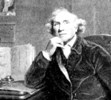Wendy Moore’s The Knife Man: Blood, Body Snatching, and the Birth of Modern Surgery is fascinating but not for the squeamish.

The key figure is John Hunter, an 18th-century anatomist and revolutionary surgeon of volatile temperament, with a hunger for knowledge that drove him to rob thousands of graves, record the tastes of corpses’ bodily fluids (“gastric juice,” apparently, “is a little saltish or brackish to the taste”), deliberately infect himself with syphilis, and … well, you should read the book.
Surgery in the 1700s was brutal, in large part due to surgeons’ appalling ignorance of anatomy. Moore puts it this way:
“Although medical students usually learned some rudimentary anatomy, this was considered a useful but not vital adjunct to on-the-job experience. And when patients died on the operating table as a result of ignorance and blundering, as they frequently did, few, if any, lessons were learned from the outcome.”
Antiseptic and anesthesia were not discovered until the 1800s, so the brutality and low success rates of surgery in the 1700s make some sense. But the ignorance of anatomy is odd — after all, the 1700s were two centuries after Andreas Vesalius and one century after Francis Bacon. How slowly things change sometimes.
The revolution in anatomical knowledge pioneered by Vesalius and the epistemological revolution pioneered by Bacon — with its emphasis on observation and experiment — had not yet reached English medicine, or only barely so. As Moore puts it, “treatment regimes still owed their basic principles largely to the theories of the ancient Greeks.” The reverence for tradition and authority was so strong that it took a pugnacious, thick-skinned man like Hunter to be willing to crack heads, literally and metaphorically, with his colleagues to get them to consider new methods.
More on John Hunter at the Endocrine Today site.
Follow up: My post on Anatomy and Philosophy.
You may enjoy the 1985 movie The Doctor and The Devils, which portrays this same sort of scenario – robbing graves and snatching bodies for dissection and medical research.
Thanks, Barry. I will check it out. Stephen
It has quite a cast: http://www.imdb.com/title/tt0089034/